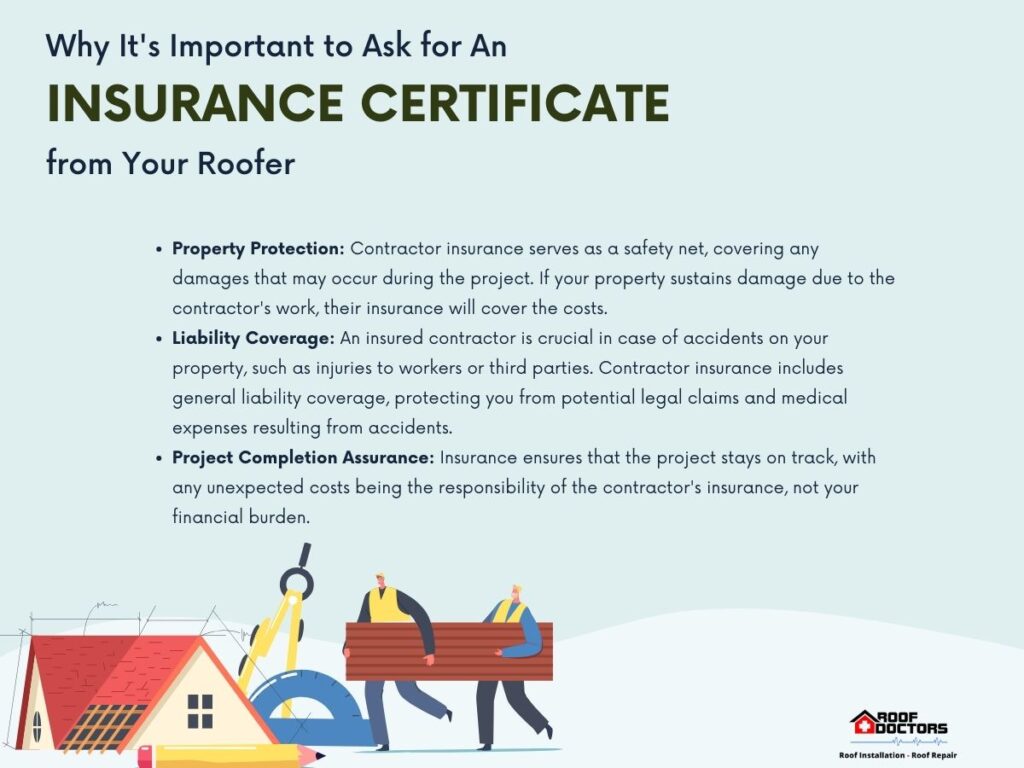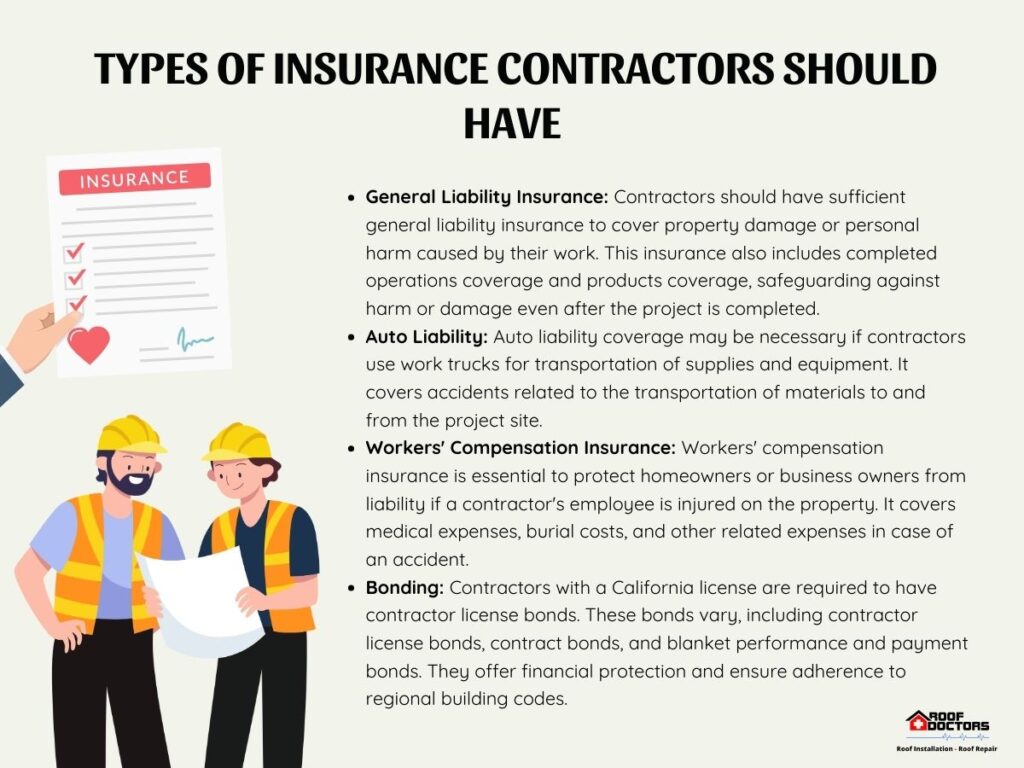“Ask Contractors to Provide Proof of Insurance” is a critical step in safeguarding your investment when hiring contractors to work on your California home.Making educated decisions is essential to safeguarding your investment when hiring contractors to work on your California home. Homeowners must know their repair rights and take charge to prevent potential issues.
California has its own set of rules and specifications for contractor insurance, just like many other states. There could be serious repercussions if these rules are disregarded or if proof of insurance is not provided.
With the help of this article, informed customers should be able to engage with contractors more successfully, and as a result, prevent themselves from falling prey to dishonest or unlicensed operators.
Why It’s Important to Ask for An Insurance Certificate from Your Roofer
It is easy to get caught up in the exciting design and planning details while starting a home renovation project in California. Recognizing the importance of contractor insurance is essential to guarantee the success, safety, and legality of any home improvement job, be it a huge makeover or a minor repair.
Trust a licensed, insured roofing contractor for all significant roof work, ensuring reliability and safety.

- Property Protection
Home improvement projects can involve significant alterations, from structural changes to electrical and plumbing work. These alterations come with inherent risks, such as accidental damage or unforeseen issues.
Contractor insurance acts as a safety net, covering any damages that may occur during the project. This means that if your property sustains damage due to the contractor’s work, their insurance will be responsible for covering the costs.
- Liability Coverage
Having an insured contractor is crucial in the event of accidents on your property, like injuries to workers or third parties. Contractor insurance typically includes general liability coverage, which protects you from potential legal claims and medical expenses resulting from accidents.
- Project Completion Assurance
If the contractor’s insurance is insufficient or nonexistent, you may find yourself footing the bill for unforeseen expenses. Consequently, this can result in a considerable financial burden and even lead to project abandonment.
Insurance ensures that the project stays on track, with any unexpected costs being the responsibility of the contractor’s insurance, not your wallet.
Legal and Financial Consequences of Hiring Uninsured Contractors
Hiring an uninsured contractor in California can have severe legal and financial repercussions for homeowners. Understanding the potential consequences is essential for making informed decisions when selecting a contractor.
Here are some of the key issues you may face:
Legal Implications for Homeowners
- Liability for Injuries: If a worker is injured on your property while working for an uninsured contractor, you may be held liable for their medical expenses and lost wages. This can lead to costly legal battles and personal financial liability.
- Lawsuits and Legal Claims: Uninsured contractors can expose homeowners to lawsuits and legal claims for property damage or injuries caused by the contractor’s work. Legal battles can be time-consuming, stressful, and expensive.
- Regulatory Penalties: Hiring an uninsured contractor may also result in regulatory penalties for homeowners. In California, there are specific legal requirements regarding contractor insurance, and failing to adhere to these requirements can lead to fines and other legal consequences.
Financial Risks
- Out-of-Pocket Costs: When working with an uninsured contractor, homeowners may be left to cover the costs of property damage, accidents, or incomplete work out of their own pocket. This can lead to unexpected financial burdens.
- Project Abandonment: In cases of disputes or unforeseen issues, uninsured contractors may abandon the project, leaving homeowners with an unfinished or poorly executed job. Completing the work can require hiring another contractor and incurring additional expenses.
- Inadequate Compensation for Damages: Even if you win a lawsuit against an uninsured contractor, they may not have the financial resources to compensate you adequately. Recovering your losses can be challenging when the responsible party is financially unstable.
What You Need to Know About Certificates of Insurance
A certificate of insurance (COI) is a document that has every relevant detail about an insurance policy in a standardized, clearly readable style. A Certificate of Insurance (COI) aims to verify a policy’s validity, facilitate prompt access to coverage details, mitigate risk, and safeguard against third-party liability.
It is important to address liability risks for all projects, regardless of size, as failure leaves project managers, owners, and investors open to insufficient loss transfer and reputational damage. Large-scale projects like building hotels involve a lot of third parties that need to be monitored, like investors, general contractors, subcontractors, and even bystanders.
It’s advisable for all project participants to have insurance coverage, but reviewing every policy in detail would consume an entire workday.The easiest way to mitigate risk and lower liabilities is to record, monitor, and handle valid insurance certificates from third parties diligently.
Doing otherwise provides plenty of room for important facts to be overlooked. The COI provides information about your policy, such as:
- Company name
- Insurer name
- Type of Insurance
- Policy numbers
- Policy effective dates
- Coverage limits
Types of Insurance Contractors Should Have
In California, contractors are required to carry specific types of insurance to operate legally. Understanding these insurance types is vital for homeowners, as it helps ensure that the contractor they hire is adequately covered.

1. General Liability Insurance
Check for sufficient general liability insurance coverage from a contractor before working with them. Contractors should always get general liability insurance because it protects them in the event that their work causes property damage or personal harm.
In other words, insurance pays for costs associated with incidents, injuries, and property damage that arise throughout the project. The contractors’ insurance plans would cover the damage if they had any.
Ensure contractor insurance covers completed operations, products, and meets adequate general liability limits. Covers harm or damage from contractor’s work after completion.
Contractor’s insurance shields against legal action for harm and provides coverage in case of contractor-related risks.
2. Auto Liability
Many homeowners and business owners forget to include auto liability coverage when hiring contractors. Some projects don’t need this coverage, and some contractors aren’t big enough to call for a fleet of work trucks.
Determine whether adding auto responsibility to your contractor criteria is something you should consider after reviewing your specific project. The trucks of contractors are frequently stocked with supplies and equipment.
This would be an auto insurance claim rather than a general liability claim if there was an accident while loading those products into the truck or unloading them into your building.
3. Workers’ Compensation Insurance
You might be asking why the roofer can’t work for you if their worker’s compensation insurance isn’t active. The worker or their family may attempt to make you liable for the harm if the roofer’s employee trips and falls off your roof or has any other kind of accident on your property.
Additionally, the homeowner or company owner is covered if the roofing contractor carries valid worker’s compensation insurance. Without worker’s compensation, roofing contractor deaths may lead to your liability for medical costs and burial expenses.
4. Bonding
Contractor license bonds are mandatory for contractors with a California license, so it’s important to understand what a bond does and does not cover. Certain bonds are intended to shield you from poor-quality construction that doesn’t adhere to regional building codes.
Bonds don’t guarantee a contractor’s competence or financial or professional honesty. Large-scale projects typically require licensed contractors to get bonds from institutional lenders like savings and loans, insurance companies, or commercial banks.
Bonds could be categorized as:
- Contractor License Bonds
A $15,000 contractor licensing bond is necessary for contractors with licenses. This bond covers any project that the contractor consents to take on. A bond may not cover multiple complaints if the project’s value exceeds the bond amount.
- Contract Bonds
Contract bonds ensure that all labor and materials will be paid for and the job’s completion. Typically, the bonding company will only be required to pay the bond’s face value. One to two percent of the contract price is often required to purchase this bond.
- Blanket Performance and Payment Bonds
A contractor is not permitted by law to request a down payment on a home improvement job that exceeds $1,000 or 10% of the total contract amount. One exemption to this rule is if the contractor has secured a “Blanket Performance and Payment Bond” and has it on file with CSLB.
If a contractor has this bond on file, they are able to request payment in full upfront. The bond amount is enough to cover all open contracts at any given moment. Usually reserved for high-volume businesses, this kind of bond is uncommon.
Red Flags to Watch Out For
When it comes to hiring contractors in California, spotting red flags related to their insurance can help you avoid costly mistakes. Here are some warning signs that should make you cautious when considering a contractor:

- Reluctance to Provide Proof of Insurance: A contractor who hesitates to show proof of insurance may be a red flag.
- Inadequate Coverage: Ensure that the contractor’s insurance coverage is sufficient for your project’s needs.
- Expired Policies: An expired insurance policy indicates a lack of current coverage.
- Unverified Insurance Providers: Verify the legitimacy of the insurance provider to avoid potential scams.
- Low Bidding with No Insurance: Extremely low bids without insurance may signify a risky or unreliable contractor.
- Unusually High Deductibles: High deductibles could result in significant out-of-pocket costs for you.
- Sketchy or Incomplete Contracts: Contracts should be clear and comprehensive; vague or incomplete agreements are concerning.
- Multiple Name Changes or Business Addresses: Frequent name changes or changing business addresses may indicate a lack of stability or credibility.
- Lack of Referrals or Reviews: Contractors with no referrals or positive reviews should be approached with caution.
- No Permits or Licensing: Ensure the contractor holds the necessary permits and licenses for your project to avoid legal issues.
Common home renovation scams
- The Door-to-Door Game
A door-to-door salesman presents you with a “good deal” in this scam since they just happen to be in the neighborhood with all their supplies and equipment. To receive discounted pricing on the necessary work, they request that you sign the contract right away.
Alternatively, a salesperson can offer to “inspect” your roof at no cost, pointing out areas like your chimney or furnace. After that, you are informed that costly and urgent repair work needs to be done, and the person offers to handle the task and gets a contract ready for you to sign.
- The Disappearing Contractor
Never give in to pressure from a contractor to make a sizable down payment to cover supplies or other costs. The contractor could take the deposit and never even start the project that they were contracted to complete.
Limit pre-work payment to under 10% and never pay the full contract amount until completion. Reputable home remodeling businesses have sufficient credit to purchase the required supplies.
- The Paper-Free Deal
Since a contract is your best line of defense as a customer, a contractor who lacks the proper documentation—contracts, estimates, professional licenses, and building permits, among others—is probably not someone you should trust.
Even while cash arrangements can seem attractive, it’s a good idea to steer clear of them because, in the event that something goes wrong with your project, you won’t have a receipt as proof of payment.
Always keep in mind that reputable companies abide by the law. A contractor’s professional license attests to his or her suitability for the services you engage them for. Your municipality can make sure that any planned work complies with the requirements and regulations of the Building Code, thanks to building permits.
Contractor Warranty Requirements in California
Verify California contractor insurance for financial safety and project success when hiring contractors for home improvements.However, it’s important to remember that securing your financial safety doesn’t end with this precaution.
While checking a contractor’s license is crucial, warranties are another layer of protection to consider. Warranties safeguard investments, assuring work quality. Contractors promise quality and shield homeowners from unexpected expenses due to defects.Here are contractor warranty requirements in California.


